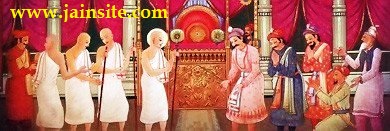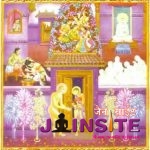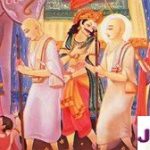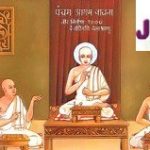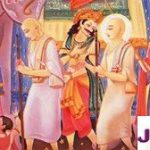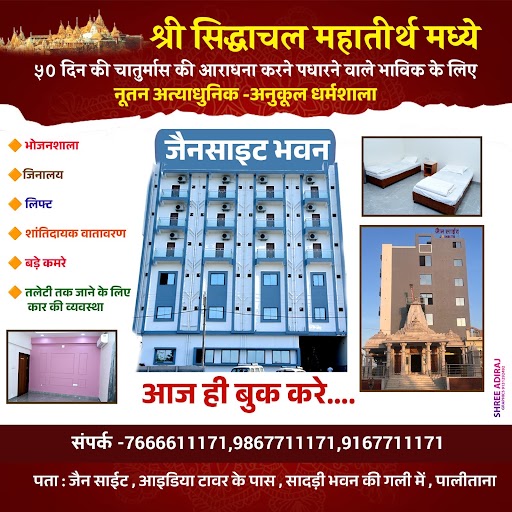Acharya Hirsurishwarji Maharaja (King Akbar Pratibodhak)
Once Emperor Akbar was looking towards the main road from the balcony of his royal palace in Fatehpur Sikri. Meanwhile he saw a huge procession passing by, wherein at the centre a Jain laywoman (shravika) named Champa sat in splendour and attired in expensive clothes. On inquiry, the emperor came to know that the shravika had undertaken fast for 6 months during which she had taken only boiled water from sun-rise to sun-set and no other food. The Emperor was greatly surprised and on asking the shravika he came to know that it was possible because of the blessings of religious saint like Guru Hirvijaysuri.
The subedar of Ahmedabad and other Jain laymen (shravaks) requested Shri Hirvijaysuri to pay a visit to Akbar in the interest of Jain religion. In A.D. 1582 Shri Hirvijaysuriji left the Gandhar port. In the course of his journey he gave religious discourses to an outlaw named Arjun Thakore and made him abjure his wicked ways. On the 13th day of Jyeshta month of A.D. 1583, Shri Hirvijaysuriji reached Fatehpur. On seeing the Suriji arriving, Akbar descended from the throne and went to him and bowed to him. His three princes also bowed and paid their respects. In honour of Suriji’s arrival, very costly carpets were laid in the royal palace but Suriji refused to walk on them. Akbar was surprised.
Hirvijaysuriji explained that Jain saints were forbidden to walk on land covered with cloth because that might kill the ants and other insects moving under the cloth. Akbar ordered the carpets to be removed and indeed there were many ants and insects underneath. As Akbar came to know that Suriji had made the journey of so many miles on foot, he was greatly surprised.
Akbar wanted to know about his horoscope and future life. Whereupon Suriji said that only householders would read horoscopes and make predictions as they were required to earn a livelihood. Saints like him simply aspired for knowledge and ultimate bliss. Akbar, by way of deference to Suriji, requested him to accept some gold and silver. Thereupon Suriji said that he would not accept anything. Suriji added that if he was keen to offer anything, he should order to set free the birds and animals kept in the cages. Suriji also added that he should prohibit large-scale fishing in the huge pond named Dabar and should also issue a mandate to stop violence of any kind by anybody during the festivals of Paryushan.
Akbar issued orders as was desired by Suriji. Moreover Akbar added 4 days on his own accord to the 8 days of Paryushan festival and ordered to stop the killing of animals for a total of 12 days. The mandate was also conveyed throughout his empire including Gujarat, Malwa, Ajmer, Delhi, Fatehpur, Lahore and far upto Multan. The Emperor also issued a mandate not to indulge in any sort of animal-killing in the vicinity of pilgrim places like Girnar, Taranga, Shatrunjaya, Kesariyaji, Abu, Rajgruhi and Sametshikharji. In Vikram Samvat 1640 Suriji was honoured with the title of Jagadguru (universal preceptor). Subsequently, Suriji toured Agra, Gwalior and other places and propagated Jain religion. As a result of his efforts, thousands of Hindus and Muslims gave up non-vegetarianism and alcoholism.
Born in A. D. 1527 in Oshwal family in Palanpur Shri Hirvijaysuriji became Acharya in A.D. 1554. After preaching Akbar, he began his journey (Vihar) at the age of 60. At that time there was a practice of charging toll-tax from every pilgrim at the Shatrunjaya Mahatirth. At the instance of Suriji, Emperor Akbar issued orders to abolish the tax. Suriji passed away in village Una (Saurashtra) in A.D. 1596. Akbar provided 100 bigha land for his funeral rites.
